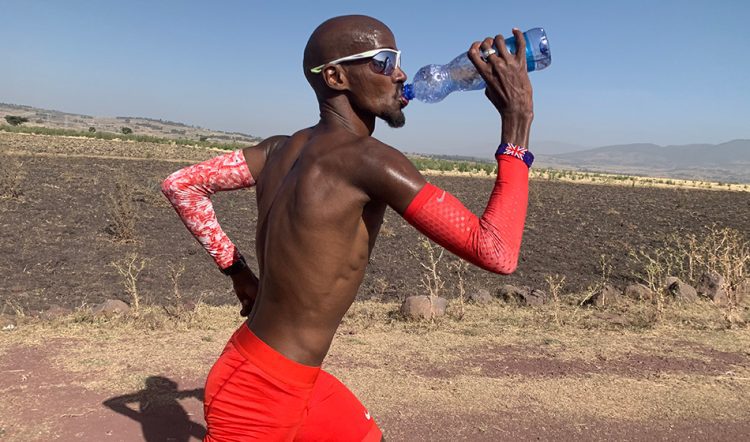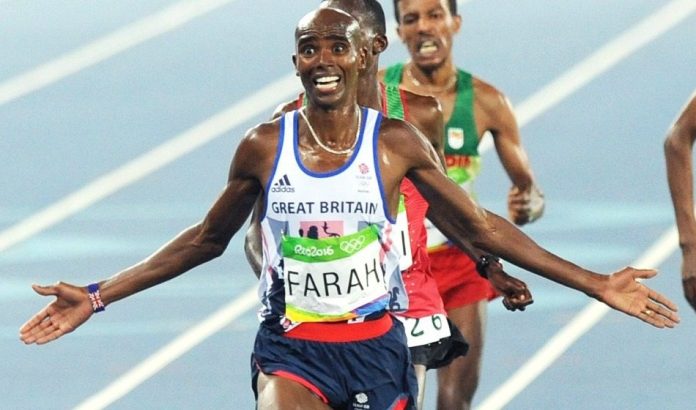The physio and former head of UKA endurance says Farah’s global 5,000m and 10,000m titles were down to careful planning, hard work and determination, as opposed to “magic drugs or illegal help”.
A new book by endurance coach and physio Barry Fudge describes Mo Farah as “the most decorated distance runner ever”, before adding: “Sometimes it’s misunderstood.”
Fudge refers to the 10 Olympic and world track titles that Farah won during a golden period between 2011 and 2017, as well as the controversy that followed Farah, especially when Alberto Salazar, the coach who guided him to Olympic triumphs in London 2012 year subsequently banned for anti-doping rule violations.
This short book by Fudge is entitled “Language”.I hate running,” and it’s meant to whet the appetite for more on the general training principles behind endurance running.
It certainly makes fascinating reading for those interested in what makes Farah tick. about the stresses and strains on her and Farah’s lives.
About the secrets of Farah’s success, Fudge says: “Between 2010 and 2017, Mo enjoyed a period of remarkable stability, avoiding the major setbacks that often derail even the most promising athletes. This longevity at the top was not due to luck or secret advantages; it was the result of careful planning, quick problem solving and the ability to see the bigger picture when it mattered most.
“Some skeptics whispered that Mo’s sustained success must be due to some magic drug or illegal help. But those of us who worked closely with him knew the truth. There was no magic, just his unwavering commitment to excellence in all aspects of preparation.”

In the book, Fudge talks about how he met Farah in the early stages of his senior career and mapped out their goals and how they were going to get there. Central to this was a concept called “own starting line”.
In the spring of 2010, his stats included a 5000m best of 13:09.14, a 1500m best of 3:33.98, a body weight of 58kg and a support team described in the book as “disorganized, with no unified strategy towards the Olympic goal”.
However, by the time the London Olympics came around, he had run 12:53.11 for the 5000m, training showed he could run sub-3:30 for the 1500m, and his body weight had dropped to 52kg.
Fudge says Farah “embodied the power of consistency.” He elaborates. “He just didn’t train hard. he trained diligently, day after day, year after year. This unwavering commitment to the process, this dedication to perfecting his craft, laid the foundation for his extraordinary achievements.”
During a long period of mostly healthy training and racing, Fudge says Farah avoided injury using cryotherapy, underwater treadmills and a detailed strength and conditioning program, much of which was put in place by Salazar and the number of clockwise and counterclockwise runs on the treadmill.
Such was Farah’s dedication, Fudge says, that he once completed the entire 20-mile race alone, monotonously circling the outside of the field.

Mo Farah (Mark Shearman)
However, injuries did come at times.Fudge recounts his Rio Olympics victories despite a painful foot problem caused by a small piece of plastic in a compression sock during a long flight.
“Moy’s career is a powerful reminder that greatness is built over time,” Fudge says.
Sometimes the path to success is a little more ‘haphazard.” , that shape the path forward By embracing ambition, understanding the determinants of success, evaluating honestly, developing a tailored process and building a strong team; you’re positioning yourself not just to compete, but to win. And when you stand on that starting line, you’ll know you’ve done everything in your power to prepare.”

Mo Farah training at Richmond Park (Mark Shearman)
There’s also great insight into Farah’s training in Fudge’s words: “We had a tradition of holding basic training about 10 days before the main championship. This session served as a final physiological boost and mental confirmation of readiness.
“On this occasion, we developed a challenging workout of 1,600m, 1,200m, 800m, 400m, 200m, with a circuit that serves as a recovery between each repetition. This was the version of the classic breakdown training that Alberto preferred, designed was to replicate the increasing intensity of the final laps of the championship race.
“We have previously agreed on target rates. One rainy afternoon on a Japanese mountainside, Mo carried out the exercise with precision.Among those present was the former British 1,500m record holder until Mo broke it in 2013. What he saw stunned him.
“It was Mo’s time. 1600 meters: 3:54; 1200 meters: 2:57; 800 meters: 1:55; 400 meters: 50.1 seconds; 200 meters: 24.3 seconds.”

Mo Farah in London 2012 (Mark Shearman)
Farah’s best moment: Fudge reckons it was his loss to Caleb Ndiku over 5000m in 2015. Ndiku was in great form and took the Briton to the breaking point in the final two laps, but Farah held him off in the home straight. :
For many, though, the most interesting sections will be the ones that touch on the subject of Salazar. At one point, Fudge says that the mysterious “green cans” people spotted Salazar wearing at the 2013 World Cup warm-up were actually just harmless cans of Carlsberg lager.
In general, however, it was not an easy time, as Fudge adds; “For years we have operated under a constant cloud of suspicion and scrutiny. The situation came to a head in 2019 when Alberto received a ban during the World Championships in Doha. The news sent shockwaves through the athletics community.

Alberto Salazar and Mo Farah (PhotoRun)
“Not long after, Neil Black, who had been a staunch supporter and key figure in British Athletics, stepped down. I found myself one of the few left from our original team.
“Around that time I was informed that BBC Panorama was making another documentary in which I would feature. The wait was excruciating. When the show finally aired, it raised questions about the L-carnitine injection given before the London Marathon in 2014. Although the procedure was perfectly legal and part of a potential future research project that would benefit our distance runners, it was depicted in a way that was inappropriate.
“What shocked me the most was that much of the content of the documentary came from emails shared with USADA in 2015 to support their investigation. It appeared that these messages were shared with the press, a breach of trust that deeply disappointed me.
“Continued scrutiny took a toll. Before long, the world was engulfed by the COVID-19 pandemic. In some ways, the enforced hiatus provided a respite from the relentless pressure.”

Barry Fudge (Getty)
The book is also tinged with sadness, as Fudge says he lost his home, most of his savings and most of his identity when he left the U.S. He also felt under-recognized in British athletics In addition, he lost coaching partners with whom he had worked closely as well Neil Black and: John Nuttall.
However, the book ends on an optimistic note. “I accepted the position of head coach of the Saudi Arabian national team, and before that I worked for two years at the Aspire Academy in Doha.”
Despite ending work with Farah in 2017, she remains on good terms with the now-retired distance runner. stay in touch, talking regularly about our families and future plans.’
You can buy “I hate running. an unexpected path to athletic excellence» here.

» Subscribe to AW Magazine herecheck out our new podcast! here or subscribe to our digital archive of back issues from 1945 to the present day here


